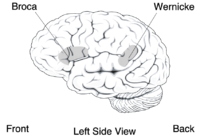
Photo from wikipedia
We aimed to identify nonconvulsive seizures (NCS) and nonconvulsive status epilepticus (NCSE) in a pediatric intensive care unit (PICU). A prospective cohort study on 35 patients who underwent continuous electroencephalographic… Click to show full abstract
We aimed to identify nonconvulsive seizures (NCS) and nonconvulsive status epilepticus (NCSE) in a pediatric intensive care unit (PICU). A prospective cohort study on 35 patients who underwent continuous electroencephalographic monitoring in the PICU was done. The patients were evaluated to collect data of their demographics, clinical diagnoses, clinical seizures by electroencephalography, and neuroimaging findings. One case with NCSE and 4 cases with NCS were diagnosed among the 35 patients. The etiology of the patient with NCSE showed antiepileptic drug (AED) withdrawal. The etiology of the patients with NCS included electrical injury, head trauma, subarachnoid hemorrhage, and pneumonia. The findings suggest that younger age, epilepsy, acute structural brain abnormalities, abrupt cessation of AED, and clinically overt seizures before NCSE/NCS are associated with significant risk for NCS/NCSE. In addition, the electrical injury may also be considered as a risk factor for electrographic seizure though such a case has not yet been reported.
Journal Title: Clinical pediatrics
Year Published: 2023
Link to full text (if available)
Share on Social Media: Sign Up to like & get
recommendations!